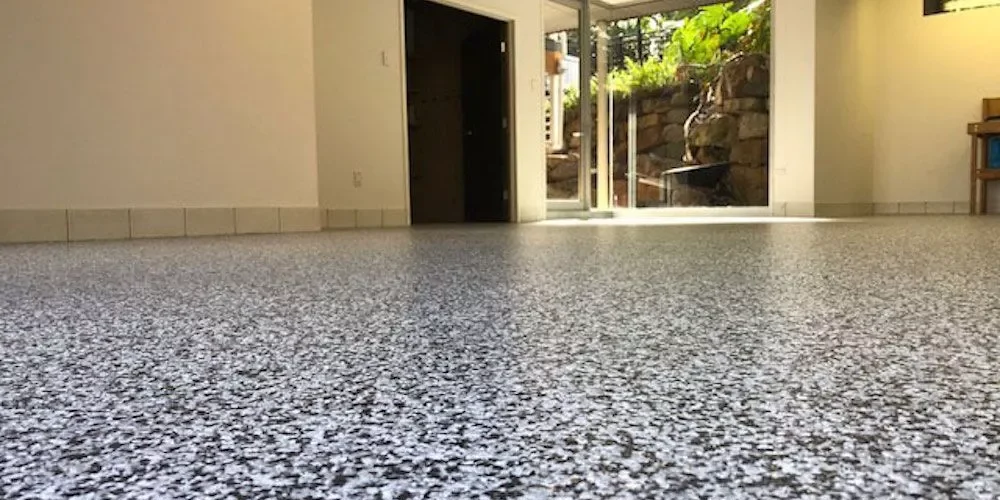Garage floor coatings are not just about aesthetics; they’re a crucial protective layer for one of the most heavily used spaces in your home. These coatings are designed to shield your concrete floors from the daily wear and tear of vehicles, foot traffic, chemical spills, and moisture. The most common types include epoxy, polyaspartic, and polyurethane, each with its unique benefits, from durability to resistance against stains and UV light.
Importance of Coating Your Garage Floor
The importance of coating your garage floor goes beyond mere appearance. A coated floor is easier to clean, resistant to oil and chemical spills, and can prevent the wear and cracking of concrete over time. Additionally, it can improve safety by providing a non-slip surface and enhance the overall value of your home by transforming the garage into a more finished and functional space.
Overview of Factors Affecting Garage Floor Coating Cost
Understanding the factors that impact the garage floor coating cost is crucial for budgeting. These include the garage’s size, the floor’s current condition, the selected coating material, and labor costs if you’re considering professional installation. This article aims to break down these elements, offering a comprehensive view to help you make an informed decision.
Types of Garage Floor Coatings
Epoxy Coatings
Epoxy coatings are a go-to for many homeowners due to their balance of cost and performance. An epoxy coating is a thermosetting resin applied in several layers to create a hard, durable surface. It’s resistant to stains, chemicals, and abrasions, making it ideal for busy garages. However, it can be slippery when wet, and its application requires specific temperature and humidity conditions.
Polyaspartic Coatings
Polyaspartic coatings are a newer technology in the world of garage floor coatings. They cure quickly, often within a day, minimizing downtime. Polyaspartic coatings are UV stable, so they won’t yellow over time like some epoxies, and they’re highly resistant to chemicals and abrasions. The downside is their cost, which can be significantly higher than epoxy, and application can be more challenging.
Polyurethane Coatings
Polyurethane coatings offer excellent flexibility, making them more resistant to impacts and scratches than epoxy. They are also UV stable and provide a high-gloss finish that’s easier to clean and maintain. However, like polyaspartic coatings, polyurethane can be more expensive and may require more complex preparation and application processes.
Factors Influencing Garage Floor Coating Cost
Size of the Garage
The garage floor coating cost scales with the size of your garage. A larger garage will require more material, and consequently, more labor, increasing the overall cost. Pricing is typically based on square footage, so measuring your garage accurately is a critical first step in estimating your project costs.
Condition of the Garage Floor
The initial state of your garage floor plays a significant role in the final cost. Floors with cracks, chips, or uneven surfaces may require repair or preparation before coating. This prep work can involve patching, grinding, or leveling, which adds to the project’s complexity and cost.
Type of Coating Material Selected
The choice of coating material has a direct impact on the cost. Epoxy, being the most affordable, offers a balance between durability and price. Polyaspartic and polyurethane, while more expensive, provide additional benefits such as faster curing times and UV resistance, which may be worth the investment depending on your specific needs.
How to Choose the Right Garage Floor Coating
Assessing Your Garage’s Needs
Choosing the right garage floor coating starts with clearly understanding how you use your garage. Is it merely for parking vehicles, or does it double as a workshop or recreational space? Factors like temperature fluctuations, exposure to sunlight, and the likelihood of chemical spills should influence your decision. Additionally, consider the amount of traffic your garage floor will endure. This assessment will guide you toward a coating that not only fits your budget but also meets your performance requirements.
Comparing Long-Term Value vs. Upfront Cost
While the initial garage floor coating cost is an important consideration, it’s equally crucial to think about long-term value. Cheaper options might save you money upfront but could require more frequent repairs or replacements. More expensive coatings, such as polyaspartic or polyurethane, offer greater durability and longevity, potentially saving money over time. Evaluate the warranty, maintenance needs, and expected lifespan of each option to determine the most cost-effective solution for your garage.
Consulting with Professionals
Consulting with professional installers can provide valuable insights even if you’re leaning towards a DIY approach. They can offer advice on the best type of coating for your specific situation, help you understand potential challenges, and give you a clear picture of the cost of coating a garage floor professionally. Getting multiple quotes will also help ensure you’re getting a fair price for the work, whether you decide to go the professional route or tackle the project yourself.
Preparing for Garage Floor Coating Installation
DIY Preparation Tips
Preparation is key to a successful garage floor coating application. Start by thoroughly cleaning your garage floor to remove dirt, oil, and grease. Repair any cracks or chips, and grind down any uneven areas to ensure a smooth surface. Applying a primer can also improve the adhesion of the coating. Although DIY preparation can be labor-intensive, it’s a vital step in ensuring the longevity of your floor coating.
What to Expect from Professional Installation
Professional installation offers the benefit of expertise and efficiency. Installers will handle the entire process, from floor preparation to the final coating, ensuring a high-quality finish. Before work begins, clear your garage and make arrangements for alternative storage or parking. Professionals can typically complete the job within a few days, depending on the coating type and garage size, and they should provide care instructions to help you maintain the floor’s appearance and durability.
Maintenance and Care of Garage Floor Coatings
Routine Maintenance Tips
Regular maintenance can significantly extend the life of your garage floor coating. Sweep or dust mop regularly to remove debris, and clean spills promptly to prevent stains. For deeper cleaning, use a mild detergent and water, avoiding harsh chemicals that could damage the coating. Inspecting your floor annually for any signs of wear or damage will allow you to address issues before they become major problems.
Dealing with Spills and Stains
Spills, especially those involving oil, chemicals, or other corrosive substances, should be cleaned immediately. Most garage floor coatings are resistant to stains, but letting spills sit can lead to discoloration or damage. Use absorbent materials to soak up liquids, then clean the area with a mild cleaner and rinse thoroughly.
Long-Term Care Strategies
Even the best garage floor coatings may show signs of wear over time, especially in high-traffic areas. Touch-up kits are available for minor repairs, or you may consider recoating the entire floor every several years to maintain its appearance and protective qualities. Staying proactive about maintenance and care will keep your garage floor looking great and performing well for years to come.
Frequently Asked Questions (FAQs)
What is the average cost to coat a garage floor?
The cost to coat a garage floor can vary widely depending on several factors, including the size of your garage, the type of coating material you choose, and the condition of your existing floor. On average, homeowners can expect to spend between $3 to $12 per square foot for professional installation. DIY options may cost less upfront but require time, effort, and the purchase of materials and equipment.
Why do garage floor coatings vary so much in price?
Prices for garage floor coatings vary due to the quality and type of coating materials (e.g., epoxy, polyaspartic, polyurethane), the complexity of the application process, and the condition of the garage floor. Higher-quality materials and extensive floor repairs or preparation work will increase the overall cost.
Can I apply a garage floor coating myself to save money?
Yes, it’s possible to apply a garage floor coating yourself. DIY kits are available and can save you on labor costs. However, it’s essential to follow the instructions carefully and be prepared for the physical effort and time commitment required. Keep in mind that professional applications typically come with warranties and a higher level of durability.
How long does a garage floor coating last?
The lifespan of a garage floor coating depends on the type of material used, the quality of the application, and how well the floor is maintained. On average, a professionally installed epoxy or polyaspartic floor coating can last 10 to 20 years or more with proper care. Polyurethane coatings, known for their flexibility and resistance to UV light, also offer a similar lifespan.
Is it worth investing in a garage floor coating?
Investing in a garage floor coating is often considered worth the cost for many homeowners. Benefits include improved durability, resistance to stains and spills, enhanced safety, and increased aesthetic appeal. A well-maintained coated garage floor can also add value to your home.
What is the best time of year to apply a garage floor coating?
The best time to apply a garage floor coating is during moderate temperature and humidity levels, typically in the spring or fall. Extreme temperatures can affect the curing process of the coating material, so it’s important to follow the manufacturer’s recommendations for application conditions.
Can garage floor coatings be repaired if they get damaged?
Yes, garage floor coatings can be repaired if they become chipped, cracked, or peeling. Smaller areas can often be patched up without needing to recoat the entire floor. However, significant damage or wear might require a professional assessment to determine the best course of action.
Do garage floor coatings require special maintenance?
Garage floor coatings are relatively low maintenance but do require regular cleaning to maintain their appearance and durability. Avoid using harsh chemicals, and clean up spills promptly to prevent staining. Periodic inspections can help catch any potential issues early on.
Conclusion
Investing in a garage floor coating is an excellent way to enhance the functionality, safety, and aesthetics of your garage while protecting your concrete floor from damage. While the garage floor coating cost varies based on size, condition, and material choice, understanding these factors and the associated benefits can help you make an informed decision that meets your needs and budget. With proper preparation, application, and maintenance, your coated garage floor can provide lasting value and enjoyment, making it a wise investment for any homeowner.







